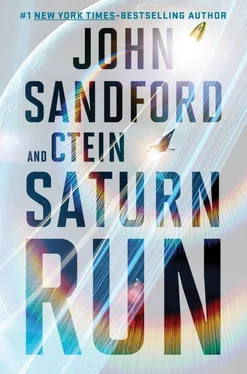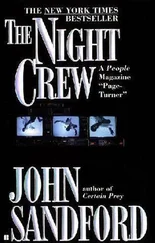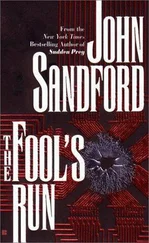Hannegan said to Stuyvesant, “The admiral’ll have to sign off on using our trade points for that, but I think that’s the way to go—get as much of basic science as we can, while we can, in the I/O stream. We can pass the science along to Earth as quickly as we get it. If the ship gets blown up on the way back, we’re gonna lose both the readers and the QSUs, anyway…. Better to have the science, than a little bit of random tech about the QSU readers.”
Stuyvesant nodded: “I agree. Let’s get that started.”
The jukebox spoke up, unprompted: “Your communications technician wishes to speak to you about placing a communications link on the surface of the station. He cannot reach you with your radio/video link.”
“Why not?” Hannegan asked.
“Unregistered electromagnetic radiation is suppressed between rooms in the station. Not all the trade items stored here are neutrally receptive to electromagnetic radiation.”
“I’ll get it,” Emwiller said. She walked toward the hallway where the tech had gone.
Crow said, “I’ll come with you.”
Sandy handed him the mini-Red that Fiorella had been using: “Take this. It’s running.”
When they were gone, Clover glanced at the other crew members, then asked, “Is there a God?”
Wurly: “Concepts of God are extremely varied but the consensus of the varied species put the probability of the existence of God at forty-two percent.”
“Really?”
“No, not really. I was programmed to answer in this way. Concepts of God are so varied that no computation is possible.”
Stuyvesant: “John, did you catch that? His maker had a sense of humor.”
Clover nodded: “Yes. Wonderful.”
Clover asked, “Your lack of information strikes us as a form of secrecy. Why so much secrecy?”
The answer-bot rippled mauve and puce for a second.
“This question is frequently asked, in various forms, by new arrivals. The purpose of depots like this one is to allow contact between alien species without direct contact. Early on, direct contacts were tried many times, by many different species, in many different ways. It almost always went badly. With few exceptions, alien species are too different from each other to allow constructive interaction. At best the efforts were extremely discomforting to one or both of the contactees. At worst, one or both found the other genuinely repugnant in some way.
“Contact invariably began with good intentions and no thoughts of hostility. Almost invariably those intentions failed. None of the failures were productive, and some of them were catastrophic. Eventually the surviving species still capable of interstellar travel devised this system of depots to safely provide some degree of cooperation and interaction.
“The depots provide two services. They are fuel production and storage facilities for antimatter-powered starships, and they are ‘trading posts’ of a sort. Arriving ships have automatic access to the antimatter storage vessels. In addition, they may offer trade goods, which are scored by a trade computer. They may take away items from the storeroom with similar scores, up to eight.”
Clover was intrigued: “There is no medium of exchange? Just a scored swap?”
“That is correct. It is very difficult to measure the relative value of alien goods to other alien species. Our trade computer is highly sophisticated, but even so, there are continuing efforts to upgrade it.”
Clover said to Stuyvesant, “Well, I’ll be sheep-dipped. The advanced interstellar culture operates on a barter system. Never saw that one coming.”
He turned back to Wurly: “You said with few exceptions there were problems. But there were exceptions? There were species that did get along well?”
“Yes. There are several pairings of cooperative species and even a sequence of similar species based on what Earth science would call convergent evolution. I have no information on those species.”
Clover said, “About this trade system… the trade items seem fairly trivial in value compared to the cost of actually retrieving them. The ship that just departed was several cubic kilometers in size. Why are these ships wandering around the galaxy? Trade can’t be the primary motive, can it?”
Wurly said, “No. Most ships that stop here are colony ships, on their way to colonize new planets. A certain percentage of technological societies severely damage their own planets before they become mature enough to understand the damage they are doing. In the past, a number of species have gone extinct before they achieved interstellar flight because of that damage, usually through runaway biological warfare or atomic warfare, with its consequent radiation poisoning. Those that do manage to survive despite badly damaged planetary ecosystems often look for a place to begin again to assure species survival. Planetary systems are quite common, although those that fit specific biological niches and that are not yet inhabited by advanced sentient creatures are not. Therefore, colony ships. Precise statistics are not available because of potential sampling error but it appears that between fifteen and twenty percent of advanced star-faring civilizations will sponsor at least one colony ship.”
Stuyvesant asked, “Why would they stop here? It can’t be to pick up antimatter: they would have done that at their home system and they’d already be traveling as fast as it’s possible to travel with any given technology….”
Wurly said, “No, the primary purpose for stopping is to restock supplies of consumables. Even with advanced recycling systems, some material is eventually lost and so stops are necessary. Water, for example—it would be possible to take along enough water to replace that lost on a multi-century flight, but that would add hugely to the mass that needs to be moved. The antimatter here is used simply to get them back up to traveling speed. The actual stop is made to restock consumable supplies harvested from the planetary rings.”
Clover said to Stuyvesant, “Saturn’s not just a recharge station. It’s a convenience store.”
Emwiller, Crow, and the comm tech came back, and Emwiller said, “We’re gonna have to fab an interface to one of several possibilities suggested by the station, and the station will provide a constant-broadcast link back to the Nixon . We can’t do it here. The most important thing we can get out of here will come over the I/O connection, so we need to head back.”
Sandy asked the jukebox, “Wurly, could you direct us to the trade computer?”
“Yes, it is down the hallway number 2, opening to your right.”
Sandy said to Emwiller, “We’ve got two guitars, a bass, and an amp with us. I think we should take the time to get them evaluated.”
Clover said: “Stuyvesant and I have lots more questions, and Hannegan, too…. Every minute brings up amazing stuff. Give them time to talk to the trade computer.”
Crow said, “I’d like to look around some more, anyway.”
Emwiller nodded: “Okay, but if it’s gonna take a while, if it’s like a DMV or something, you gotta be willing to cut it off so we can head back.”
The evaluation didn’t take long. The trade computer was parked in a short dead-end hallway, and when they approached, it asked, in Wurly’s voice, “Trade items for evaluation?”
“Yes.”
“Please provide a simple description.”
“Three musical instruments operated by vibrating strings which cause sound waves in gaseous atmospheres, and an electronic amplifier, powered by a battery.”
“These are somewhat common instruments, but have some value, as well,” the computer said. “Can you demonstrate their function?”
“Yes. It’ll take a minute to plug in…”
Читать дальше








